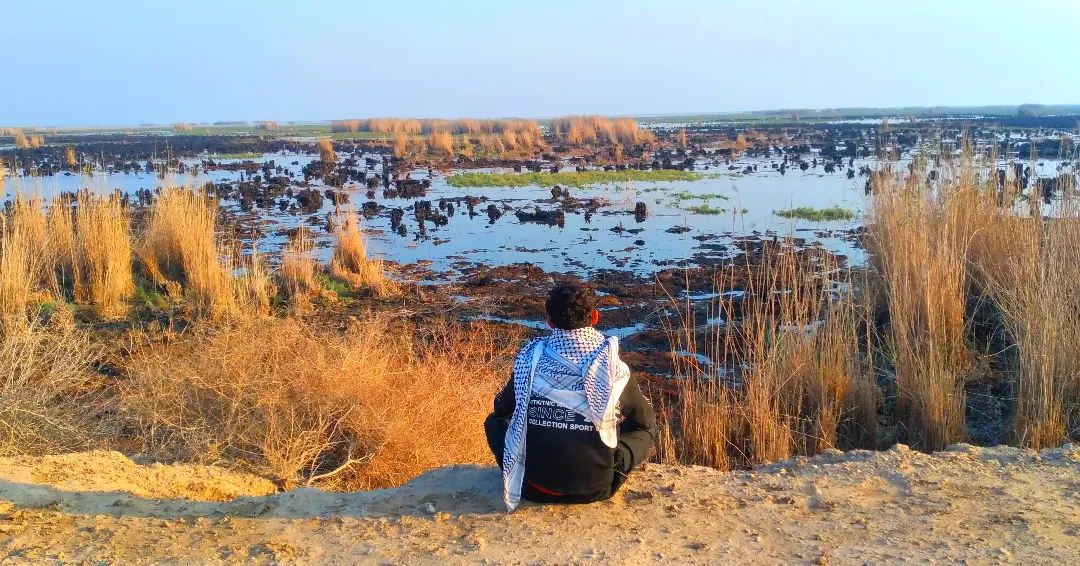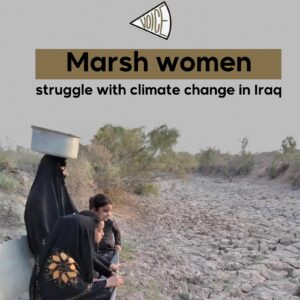Share This Article
Iraq-Maysan
Once the Middle East’s largest wetlands were dubbed the ‘garden of Eden’ due to the fertility of the land, but Iraq’s Hawizeh marshes have been parched by years of drought. Now acute water shortages, the worst in 40 years, are having a devastating impact on the livelihoods of the remaining women and families who live there.
With the sun-darkened skin and strong build typical of the women who have fished and bred buffalo here, Layla Ali, 35, is from the Hawizeh Marshes of southern Iraq. In her traditional clothes, with her black veil wrapped around her waist, she has to walk a long way to harvest the grass that grows far from her dwelling to feed her once highly valuable buffaloes who, in the on-going drought, are suffering from severe hunger.

Layla explains, “ I used to make IQD 50 ($34 USD) every day but I may not even get 20 ($14 USD) as both of my buffalo became weak now and I could only get less than of the milk that I used to make the dairy products and sell it in the city“.
“’If [the] drought continues, I threaten to lose [my] livelihood source and lose my children. We don’t have any other financial support since I lost my husband, who was killed a year ago in a bomb explosion,’’ she adds.
As well as the grass and fodder, Layla and many women in marshes are also forced to carry bottles of clean water for their families long distances. This puts more strain on their health and exposes them to the risk of harassment and violence by men, while they are looking for sustenance as a result of immigration and insecurity in these areas. Many of them will face the risk of miscarriage or infection due to issues with hygiene and health protection during pregnancy or menstruation while they are seeking clean water.
many women in marshes are also forced to carry bottles of clean water for their families long distances. This puts more strain on their health and exposes them to the risk of harassment and violence by men, while they are looking for sustenance as a result of immigration and insecurity in these areas. Many of them will face the risk of miscarriage or infection due to issues with hygiene and health protection during pregnancy or menstruation while they are seeking clean water.
The loss of the women’s ability to engage in the activities that helped support their families decades ago – making and selling dairy products – has meant a greater dependence on men now to meet basic needs. Livelihood sources have however become very limited for men as well, and many of them are unable to work either. Thus, marsh families displaced by the drought find themselves deep in poverty. This in turn exposes women and children to the risk of domestic violence from men venting their anger at the loss of income on women.
Unicef reported in August 2021 that 60% of children in Iraq lack access to clean water, while half of schools have no water at all. With Iraq’s population of 40 million expected to double by 2050, demographic growth will exponentially worsen the situation.
Since ancient times, women in the marshes have raised buffaloes, as they were responsible for providing for their families. Women used the buffalo milk to make a range of dairy produce. ‘Mashouf’, a traditional boat similar to a canoe, provided their transport between marshes. In addition, women used the marsh reeds to make roofs and umbrellas, hand fans, dishes, baskets and as raw materials for building. Those women used to sell fish, dairy items, and handicrafts made from reeds in the cities, but the women’s lifestyles and their interactions with the environment have changed dramatically since the marshes dried up, which has led to the decline of traditional practices that have been central to marsh culture for generations.


The new generation of the young girls in the marshes will no longer learn these long-established livelihood-generating customs because they will not be able to return to the marshes after the drought. The knowledge sits only with the older generation of grandmothers, who in any case have already stopped practising these traditional skills and crafts, due to the lack of materials needed, as reed production has decreased sharply due to the drought.
The new generation of the young girls in the marshes will no longer learn these long-established livelihood-generating customs because they will not be able to return to the marshes after the drought. The knowledge sits only with the older generation of grandmothers.
Amal Hussein, 40, from Maysan, southern Iraq who has been forced to move to Basra in southern Iraq with her last two buffalo, says that, “The daily activities that were practised by the marsh women have become more difficult in light of the effects of climate change in the marshes. Women are the first who suffer from a lack of water due to drought. This affected buffalo raising and decreased their number, as buffaloes are sensitive to water quality and high temperature.” Ultimately, she says, “With depriving the marshes communities of pure water, this led to the immigration of thousands of families to move to urban areas of Maysan and Basra’’.
“Because of immigration, the lifestyle of the marsh women has changed, as they were forced to stay in tin houses and tents instead of the reeds they were used to previously, in order to take care of household activities and children while the men went out looking for livelihood sources,” she continues.
“Because of immigration, the lifestyle of the marsh women has changed, as they were forced to stay in tin houses and tents instead of the reeds”
Climate migration is already a reality in Iraq. At the end of 2021, the International Organization for Migration (IOM) recorded approximately 20,000 people displaced due to water scarcity (looking at only 10 of Iraq’s 19 governorates), with high salinity, and poor water quality across the country.
In the marshes, where the rearing of water buffaloes has been the way of life for generations, there is nothing left but barren land to witness the ravages of climate change. With the increase in temperatures for several consecutive years, both the levels of precipitation and water flow have receded, and the livelihoods of buffalo breeders, who depend on water as a primary source of livelihood, have diminished. Many buffalo herders in Hawiza marshes say that their cattle have died.
This year, acute water shortages, the worst in 40 years, have forced many buffalo herders to leave their homes and migrate to urban cities to look for work, according to the Food and Agriculture Organisation.
Ahead of the COP27 in Egypt last year, a survey by the Norwegian Refugee Council (NRC) found that Iraq experienced a second consecutive year of drought and record low levels of rainfall across the country. Country Director, James Munn, commented: ‘’A worsening climate and water crisis spells disaster for regions that have long relied on agriculture and water as the principal source of income and livelihoods.” The fear is that, “Iraq’s marsh communities will be forced from their lands to urban areas in search of alternative sources of income which will lead to more economic and security problems for the urban areas,’’ he continued.
While many families in the marshes have been able to keep their cattle, especially buffaloes, this is on a much reduced scale. It seems that this activity is no longer sustainable as the buffaloes often get sick from the polluted water and die. Since there is much less forage now, many breeders have started to sell one of their herd in order to buy livestock feed and water for the other buffalo.
The World Bank estimates that water scarcity could cause the region’s economies to lose between six and 14 percent of their gross domestic product by 2050. Its climate and development report for the country released last month argues that a “multidimensional development and climate crisis is brewing”. The PAX organisation has said that 41% of marsh areas have suffered from decreased water levels and wetness, noting the disastrous impact on more than 6,000 families who “are losing their buffaloes”.
In response to the urgent needs of the marsh communities, in November last year, the Government of Sweden through its development agency (Sida) and the UN Food and Agriculture Organization (FAO), signed a four-year, SEK 112 million (US$ 10.2 million) agreement to enhance the climate resilience of vulnerable agricultural households in four governorates.
Research by the International Organization for Migration (IOM) found that in southern Iraq, an estimated 8 percent of households (3 percent in Basra, 13 percent in , and 13 percent in Maysan) are fully reliant on agriculture, livestock, or fishing and have no alternate source of income (such as from employment in government or security forces), equating to roughly 75,000 people. The dangers are clear. Often, abandoning agriculture is coupled with migration, and 20 percent of households in southern Iraq who abandoned farming report that one member migrated in the past five years (a rate much higher than non-agricultural families) while according to IOM’s report, another 30 percent indicate a preference to migrate.
This is felt keenly by those in the region. “I feel like I lost my children because of the drought,” says 50-year-old Halema who was born in a reed tent in the marshes of Al-Hawiza, Maysan Governorate. She has experienced little outside the limits of water and reed and her main job in life has been to make mats from reeds collected by her husband. People used to come from different areas of Iraq to buy the matting, but she explains that was forced to give up her craft after the marshes dried up: “As there was no longer transport by boat as before. In addition to the continuous reed fires as a result of the drought, that ended most of the reeds in the marshes.”
‘’All the reeds in our area are gone,” she says. “I lost five out of my eight buffaloes. I feel like I lost my children because of the drought. My husband and our son are also struggling to feed the other three buffaloes’’.

Halema, who now lives near the river banks, close to the marshes, with her 20-year-old son, Mustafa, who working in construction in the city but even having relocated, he still does not get a good wage.
“We are like the fish that can’t live out of water”
‘’Hope to return to my homeland. We are like the fish that can’t live out of water,’ Halema says. She has one remaining wish – to be able to return and live again in the marshes.
This report was written and produced as part of a media skills development program by “the Thomson Reuters Foundation”
